With an online chemical engineering degree, you can write your own ticket to a potentially lucrative career in one of the most dynamic, high-demand science fields of today and tomorrow.
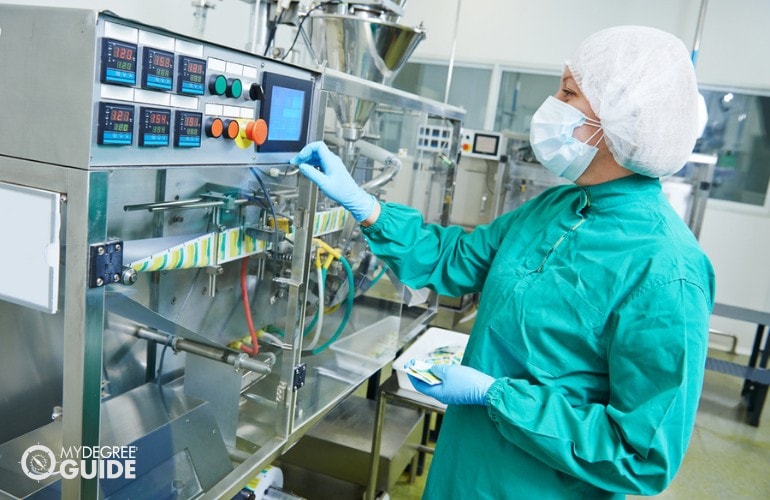
Are you a problem solver with a passion for research and hands-on experimentation? If so, chemical engineering may be the right career path for you. As a self-starter with strong motivation for education, you might consider completing your degree online.
Editorial Listing ShortCode:
While you work toward an online bachelors in chemical engineering, you can also juggle other responsibilities such as work and family. The flexibility of online learning may be right for you.
Universities Offering Online Chemical Engineering Degree Programs
Methodology: The following school list is in alphabetical order. To be included, a college or university must be regionally accredited and offer degree programs online or in a hybrid format.
Auburn University
Auburn University’s Master of Science in Chemical Engineering online offers an education in a variety of fields from biochemical engineering, environmental studies, chemical kinetics, and others. This non-thesis degree balances theory and application. New semesters begin in the spring, summer, and fall.
- MS in Chemical University
Auburn University is accredited by the Southern Association of Colleges and Schools Commission on Colleges.
Columbia University in the City of New York
Columbia University’s online Master’s Degree in Chemical Engineering offers an interdisciplinary approach to the chemical engineering field. From new technology to development of existing fields, this MS prepares students to take the next step in their chemical engineering career.
- MS in Chemical Engineering
Columbia University is accredited by the Middle States Commission on Higher Education.
Illinois Institute of Technology
Illinois Institute of Technology provides an online Master’s Degree in Chemical Engineering to give students the most up-to-date knowledge in their field. Curriculum includes a wide range of topical seminars as well as labs and a final thesis. Students graduate prepared for careers in chemical engineering research and development.
- MAS in Chemical Engineering
Illinois Institute of Technology is accredited by the Higher Learning Commission.
Kansas State University
At Kansas State University, the Master’s Degree in Chemical Engineering acclimates students to the expertise of the chemical engineering study. Students conduct research in fields such as manufacturing, energy, and electronics. A final oral exam rounds off this advanced degree.
- Master’s in Chemical Engineering
Kansas State University is accredited by the Higher Learning Commission of the North Central Association of Colleges and Schools.
Lehigh University
Lehigh University offers a Master’s Degree in Chemical Engineering based in interdisciplinary study. This 100 year-old program boasts a faculty active in their fields of study and advanced laboratory technology. A three-year program, Lehigh is open to non-engineering science scholars who desire a change of concentration.
- MEng in Chemical Engineering
Lehigh University is accredited by the Middle States Commission on Higher Education.
Michigan Technological University
Michigan Technological Institute offers a cutting-edge online Master’s in Engineering. With a customizable degree that gives hands-on experience in a variety of contemporary subjects, it’s no wonder graduates get hired by companies like Kimberly-Clark and Marathon. Students can choose to take an accelerated program to graduate in just one year.
- BS in Chemical Engineering
Michigan Tech is accredited by The Higher Learning Commission.
North Carolina State University
North Carolina State University’s Master’s of Science in Chemical Engineering is a 3-5 year program that lets students customize a flexible schedule as they take a variety of courses at their own speed. No thesis is required as part of this program.
- MS in Chemical Engineering
North Carolina State University is accredited by the Southern Association of Colleges and Schools Commission on Colleges.
Stanford University
Stanford University’s Master of Science in Chemical Engineering promises well-rounded coursework with a depth of expertise in the field. This 3-5 year program provides the knowledge necessary for scholars, business engineers, and researchers alike. Students can begin classes in the spring, summer and fall semesters.
- MS in Chemical Engineering
Stanford University is accredited by the Accrediting Commission for Senior Colleges and Universities of the Western Association of Schools and Colleges.
University of California – Riverside
U.S. News & World Report ranked the University of California—Riverside in the top 30% of engineering schools in the country. The school offers a Master’s in Chemical Engineering. The program is entirely online, and students aren’t required to come to campus. Students can potentially finish the degree requirements in just 13 months.
- MS in Chemical Engineering
The University of California – Riverside is accredited by the Western Association of Schools and Colleges.
University of Houston
The University of Houston’s Master of Chemical Engineering Degree presents theory and research alongside practical science lab work for a well-rounded degree. This degree is organized to not only give students the information they require, but also the leadership skills to advance in their career. This is a non-thesis program.
- Master of Chemical Engineering
The University of Houston is accredited by the Commission on Colleges of the Southern Association of Colleges and Schools.
University of Maryland
The University of Maryland’s Master of Chemical Engineering online program offers an individually cultivated education. Students work with a graduate advisor to form their own research topic for their master’s program. This allows students to become experts on desired topics while forming a baseline of Chemical Engineering knowledge.
- MS in Chemical and Biomolecular Engineering
The University of Maryland is accredited by the Middle States Commission on Higher Education.
University of North Dakota
The University of North Dakota’s online Bachelor’s in Chemical Engineering offers internships and design competitions alongside classes related to theory and hands-on experience. Students have the opportunity to choose between sustainability, petroleum engineering, and energetics as concentrations during their degree. This is a four-year degree program.
- BS in Chemical Engineering
The University of North Dakota is accredited by the Higher Learning Commission of the North Central Association of Colleges and Schools.
University of Southern California
At the University of Southern California’s Master’s in Chemical Engineering, students receive a top of the line education at their own convenience. This blended classroom model offers both live and recorded lectures and prepares students for the complex world of chemical engineering career paths. The university is recognized by U.S. News & World Report as one of the best in the nation.
- MS in Chemical Engineering
The University of Southern California is accredited by the Western Association of Schools and Colleges.
University of Virginia
The University of Virginia offers an online Master’s in Chemical Engineering full of research, scholarship, and hands-on experience. Students complete a plan of study and take 30 credit hours of course work in fields as varied as environmental studies, catalysis, and electrochemistry. A final oral exam finishes the degree.
- MEng in Chemical Engineering
The University of Virginia is accredited by the Commission on Colleges of the Southern Association of Colleges and Schools.
Villanova University
Villanova University’s Master of Science in Chemical Engineering program offers a core foundation of classes supplemented by mastery in specialized fields. Students have the option to take evening classes or use recorded lectures to proceed with their degree. This degree program has an even distribution of genders enrolled.
- MS in Chemical Engineering
Villanova University is accredited by the Middle States Commission on Higher Education.
Online Chemical Engineering Degrees

We’re not going to tell you that earning a bachelor of chemical engineering is easy. The work is challenging, and the courses are rigorous. But, that’s likely one of the reasons why you’re drawn to this scientific field.
While earning your online engineering degree, you can participate in research and hands-on learning. Your degree program can help prepare you to work in some of the fastest-growing industries of today. These include pharmaceuticals, energetics, renewable energy, oil and gas production, and chemicals for agriculture, to name a few.
In the field of chemical engineering, you can bring together concepts and principles from multiple scientific disciplines. Chemical engineers apply the principles of math, physics, biology, and chemistry to solve problems. They create and improve products that we use every day.
Chemical engineers make products safer, faster, more effective, and more sustainable for everyday use. These products include drugs, food, beauty products, fuel, and many more.
Upon graduation, you can expect to enter a growing workforce in chemical engineering. Through specialization in your degree program, you may become an environmental engineer or a product development engineer. Or, you might go into project management, process design, or quality control engineering.
Editorial Listing ShortCode:
Sustainability is a branch of chemical engineering that deals with sustainable energy technologies, climate change, and energy security. Energetics is a chemical engineering specialization that is applied in defense, space exploration, counter terrorism, and public safety sectors.
Petroleum engineering is another area of specialization that involves drilling and production of natural gas and oil.

Online chemical engineering courses provide a foundation of basic scientific knowledge, including chemistry, physics, math, and economics. As you progress through sequentially more advanced courses, you can learn to apply specialized, technical knowledge to solve problems, design processes, and create or improve products.
A sampling of courses in your degree program may include chemical engineering laboratory, thermodynamics, process dynamics and controls, and transport phenomena. You may also complete courses such as reactor design and plant design.
Courses in a typical chemical engineering degree program are dynamic and participatory. You can experience hands-on learning via research and internships in the industry. Student design competitions also offer opportunities to apply your knowledge to solve real-world problems.
Chemical Engineering Careers & Salaries
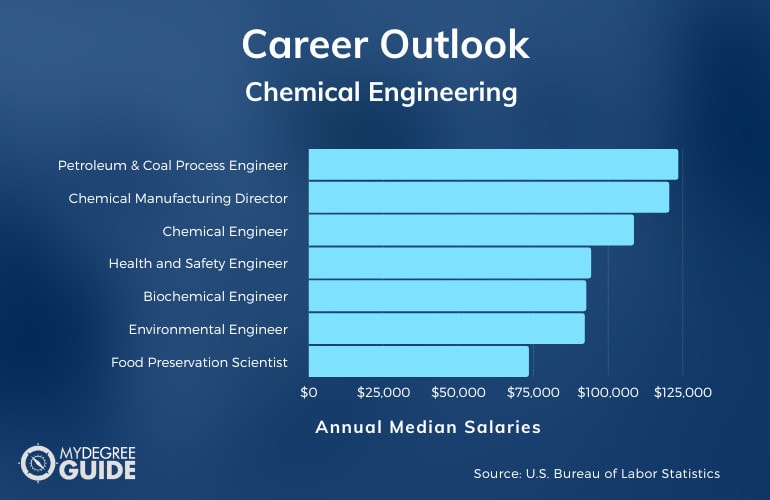
The training that chemical engineers receive in their degree programs can help prepare them to be flexible and able to move from one job to another as they build their careers.
It is not unusual for chemical engineers to transition through five or six different positions during their working years. They do this by applying their critical thinking skills, knowledge, and technical abilities to various industries.
Traditional career paths might involve working with specialty chemicals, pharmaceuticals, or oil and gas drilling and production. Other careers exist in the fields of biotech, biomedical, and process software development. Newer careers have opened up in the field of environmental sustainability. In this sector, chemical engineers might work with other scientists in multidisciplinary teams.
Editorial Listing ShortCode:
Working in environmental sustainability, chemical engineers develop clean methods of energy production and use to decrease the negative impact of these industries on the environment. Research and development for clean methods extend to industries that turn out everyday products such as food, plastics, and paint.
From an entry level position, you may move up to higher-paying jobs in project management. Project managers oversee teams of engineers to ensure adherence to budget and schedule calculations for research, development, and production projects.
According to the Center on Education and the Workforce, the median annual salary for a professional with a bachelors in chemical engineering is $96,000. Of course, entry level jobs pay somewhat lower, averaging $71,545 (National Association of Colleges and Employers), but even starting salaries for chemical engineers far exceed those of most Americans.
According to the Bureau of Labor Statistics (BLS), the lowest 10 percent of chemical engineers earned less than $68,430. The top 10 percent earned more than $168,960.
You may be wondering if the future job market makes it worth earning a chemical engineering degree online. The Bureau of Labor Statistics projects the field will grow by four percent for the next ten years with the greatest demand for chemical engineers in the manufacturing industries for various products.
| Careers | Annual Median Salary |
| Petroleum and Coal Process Engineer | $123,360 |
| Chemical Manufacturing Director | $120,330 |
| Chemical Engineer | $108,540 |
| Health and Safety Engineer | $94,240 |
| Biochemical Engineer | $92,620 |
| Environmental Engineer | $92,120 |
| Food Preservation Scientist | $73,450 |
| Chemical Plant and System Operator | $65,960 |
| Environmental Technician | $46,850 |
| Biochemistry Technician | $46,340 |
An online chemical engineering bachelor’s degree offers similar prestigious and rewarding careers similar to that of an online aerospace engineering bachelor’s degree.
Choosing an Online Bachelor’s in Chemical Engineering Degree

If you’re thinking about pursuing a bachelors in chemical engineering online, then you’ll want to shop around for the degree program that is best for you.
Consider the following criteria as you make a selection:
- Cost of tuition and fees
- Admission requirements
- Scholarships and financial assistance offered by the institution
- Regional accreditation of the institution
- Accreditation of the degree program
- Faculty credentials
- Student-to-teacher ratio
- Opportunities for industrial internships
- Special concentrations offered within the chemical engineering degree program
- Student retention rates
- Graduation rates
- Academic advising and counseling services available online
- Career placement services available online
- Alumni employment rates in the chemical engineering field
- Industries in which alumni are currently employed
- Availability of course enrollment when needed for timely program completion
- Technical support services for taking online courses
- The school’s longevity and experience in offering online education
- Ease of navigation and interaction via the school’s online classroom environment
- Flexibility in the program to fit your schedule
- Virtual availability for hands-on experiences, such as lab experiments
- Online access to software that is specific to chemical engineering
Because you will invest considerable time, energy, and money into earning your degree, it’s important to do your homework as you choose a college or university. Start with institution websites, but also talk directly with admissions counselors and faculty.
Chemical Engineering Curriculum & Courses
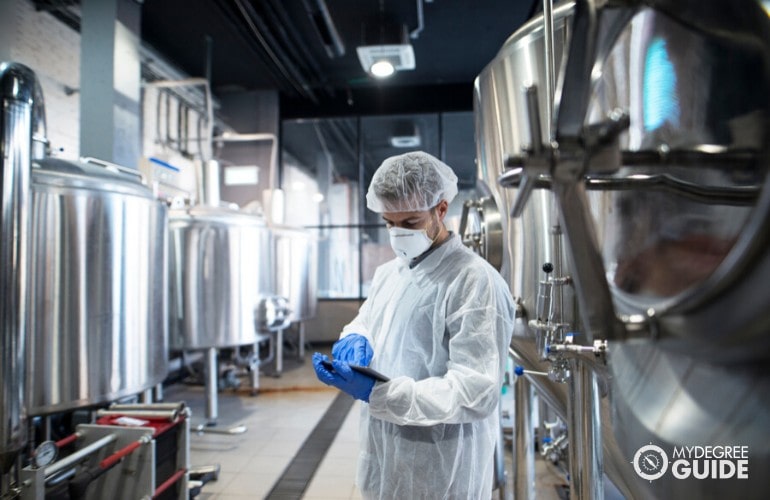
Working through the courses in your chemical engineering degree online can help you become a critical thinker. Most importantly, you can learn to apply technical knowledge to solve real-world problems.
Most bachelor’s degree programs in chemical engineering require foundation courses in the first few semesters. These include English, math, physics, and applied engineering computer methods. After foundational coursework requirements are met, you’ll advance to more detailed and specific courses in the chemical engineering discipline.
Editorial Listing ShortCode:
Here is a brief sampling of courses you’ll likely need to take to complete a B.S. in chemical engineering.
- Introduction to Chemical Engineering – Discover various applications of chemical engineering while building computer skills and acquiring a foundation in engineering design.
- Analysis of Problems in Energy and the Environment – Explore the foundations of current thought on the scientific, ethical, and political aspects of energy and the environment.
- Chemical and Biological Engineering Thermodynamics – Apply the principles of the first, second, and third laws of thermodynamics to open and closed systems.
- Mathematical and Computational Methods – Algebraic equations, initial value and boundary value differential equations. Application of analysis to solving chemical engineering problems.
- Transport Phenomena – Explore the coordinate systems of mass, momentum, and energy transport. Formulate and analyze solutions to problems of molecular diffusion, viscous flow, and heat conduction and convection.
- Chemical Reaction Engineering – Learn the fundamentals of chemical kinetics, including the design and evaluation of chemical reactors.
- Chemical Engineering Laboratory – Group and individual work in chemical engineering unit operations and technical results reporting.
- Mass Transfer and Separation Processes – Explore fluxes and component conservation equations. Apply Fick’s Law to solve problems. Study convective mass transfer, unsteady state diffusion, and more.
- Molecular Structure, Bonding, and Dynamics – Apply the principles of quantum chemistry of atoms and molecules to chemical transitions. Explore the nature of chemical bonding.
- Process Design – Apply the elements of engineering economics, energy conservation, environmental and safety regulations, and more to the design of chemical plants.
Accredited degree programs from accredited institutions should offer courses similar to those listed here. Keep in mind that this is merely a brief overview and that you’ll have many more course options on your way to graduation.
Admissions Requirements

Once you’ve done your research and decided on a few schools that interest you, it’s time to apply for admission. Here are some of the criteria that universities look for in a prospective bachelor in chemical engineering major.
- Minimum high school grade point average (GPA)
- Rank in your high school graduating class
- High grades in advanced math and science courses during high school
- Minimum SAT and ACT scores required by some schools, but not all
Schools look for evidence that you’re prepared to be successful in a chemical engineering degree program. They may ask for letters of recommendation from principals, teachers, and other leaders who knew you in high school.
Admissions departments might also request evidence of extra-curricular volunteering or work experience with emphasis on leadership. Individual schools establish unique admissions requirements. You can research these requirements on university websites. Then, make contact with admissions counselors for specific information.
Accreditation

When you’re selecting a degree program, it’s important to ensure that both the institution and the degree program are accredited by the appropriate organizations. Choose a school that holds regional accreditation from one of the following accrediting organizations.
- Higher Learning Commission
- Middle States Commission on Higher Education
- New England Commission of Higher Education
- Northwest Commission on Colleges and Universities
- Southern Association of Colleges and Schools Commission on Colleges
- WASC Senior College and University Commission
In addition to finding an institution with regional accreditation, you may also want to ensure that the chemical engineering degree program is accredited by the Accreditation Board for Engineering and Technology (ABET).
Editorial Listing ShortCode:
Accreditation is a seal of approval for your educational experience. When you apply for jobs after completing your degree, employers will want to know that you graduated from an accredited institution with an accredited bachelors in chemical engineering.
Financial Aid and Scholarships

It’s absolutely true that college tuition and fees are expensive. It may take a considerable investment in your chemical engineering degree online to reach your goal of working in a high-paying career. But there is financial help out there to help make your dream a reality.
A great place to start is the Federal Student Aid website where you can find information about many types of student aid. Your first step will be to fill out and submit the free FAFSA form. Financial help for college costs comes in the form of grants, loans, work-study jobs, and scholarships. Student aid for international students, veterans, and military families is available, too.
Additionally, you can search the websites of schools you’re interested in for information about financial assistance. Individual institutions offer many scholarships that are both need-based and merit-based. Organizations, businesses, and industries also offer scholarships at specific colleges and universities.
What is a Chemical Engineering?
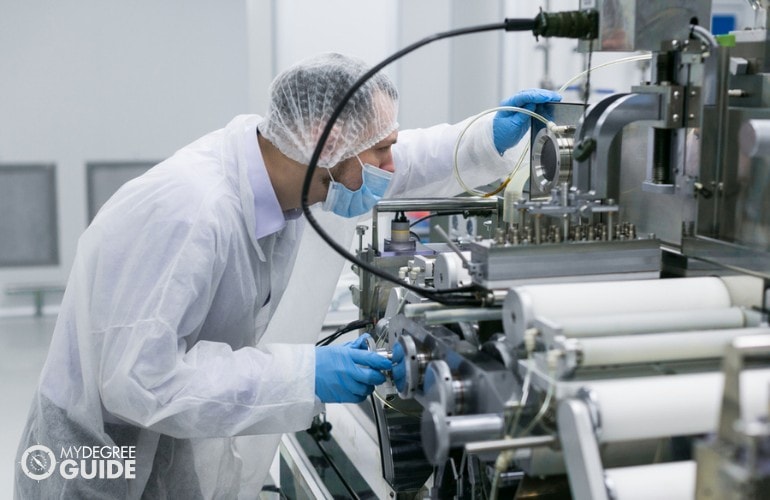
Chemical engineering is a branch of scientific endeavor that influences numerous areas of technology through the synthesis and processing of chemicals and materials. The broad discipline of chemical engineering uses principles from chemistry, biology, and physics to develop chemical transformations and products.
Chemical engineering processes begin with laboratory experimentation and carry through to full-scale production of the materials we use every day. It is one of the most broadly-based engineering disciplines, reaching out to exert influence on a wide array of industries and professions.
Chemical engineers conceive ideas and design processes that produce, transform and transport materials to make products used in a broad range of industries. Examples include the pharmaceutical, biomedical, microelectronic, and petrochemical industries.
Chemical engineering benefits society through improving and enhancing energy, human health, environmental sustainability, and product manufacturing.
What Can You Do with a Chemical Engineering Degree?

Chemical engineers work in various industries that produce paper, paint, medicines, polymers, biomedical devices, dyes, fertilizers, microelectronics, and more. They work to solve problems in many facets of daily life, including energy production, sustainability, health, the environment, and product manufacturing.
According to the Bureau of Labor Statistics, many chemical engineers choose an area of specialization. For example, process engineers specialize in a particular chemical process such as oxidation or polymerization.
Others specialize in particular fields such as biological engineering, product development, or nanomaterials. Additionally, some chemical engineers work in research, reporting results for applications in biotechnology and life sciences.
How Much Does an Online Bachelor’s in Chemical Engineering Cost?

Tuition costs vary from one university to another. A quick search of ten institutions reveals a range from a low of $293 per credit hour for in-state residents to a high of $2,148 per credit hour. It’s worth your time to shop around.
Consider these points. First of all, tuition costs for in-state residents are often lower than for out-of-state residents. Next, be sure to look at fees as well as tuition. Many schools charge fees for online classes. Finally, multiply your per-credit-hour cost by the number of credit hours that you intend to earn per semester.
How Long Does It Take to Get an Online Bachelor’s in Chemical Engineering?
Most online bachelor’s degrees in chemical engineering take three to six years to complete. A lot depends on you, the student. If you enroll in classes as a school that offers traditional, 16-week semesters and you attend full-time, it will take approximately four years.
Editorial Listing ShortCode:
If your responsibilities for work and family require you to modify enrollment, it could take up to six years to complete the degree. On the other hand, if you choose a school that offers intensive 8-week semesters and you enroll continuously year-round, it may be possible finish in three years.
Is Chemical Engineering a Good Career?

Chemical engineering offers one of the most versatile career paths in the engineering fields. So, your career as a chemical engineer can be flexible and interesting.
Chemical engineers are employed in numerous industries, and they earn well above average incomes. In addition to handsome salaries, chemical engineers work in professional positions where they receive health benefits, paid vacations, retirement contributions, and financial assistance for advanced studies.
You might see yourself as a researcher testing hypotheses in the lab or as a team member working on environmental sustainability problems. Perhaps you want to contribute to society during your career by managing resources or improving public health and safety. As a chemical engineer, you can choose one of those preferences or many other career directions.
Can You Become a Chemical Engineer Online?

To become a chemical engineer, you need to complete a bachelor’s degree in the field. It is possible to complete a chemical engineering degree online.
It is also possible to combine online courses with on-campus courses to complete a bachelor of chemical engineering. For example, basic courses in the core curriculum, such as English, math, and science courses may be completed online.
These may be followed by advanced, laboratory-based courses in the chemical engineering curriculum that are completed on campus.
What Degree Do You Need to Be a Chemical Engineer?

You need at least a bachelor’s degree to become a chemical engineer. Additionally, some chemical engineers take exams to be licensed in specific states. Although licensure is not required to work in the field, it does establish competency and shows that the chemical engineer has met educational, experience, and testing standards.
Some chemical engineers go on to earn master’s degrees, and many universities offer them fully online. Graduate certificates in chemical engineering are prevalently available online, too. Although advanced study (beyond the bachelor’s degree) helps chemical engineers to enhance their knowledge and skills, it is not necessary for getting started in your career.
What’s the Difference Between Chemistry vs. Chemical Engineering?
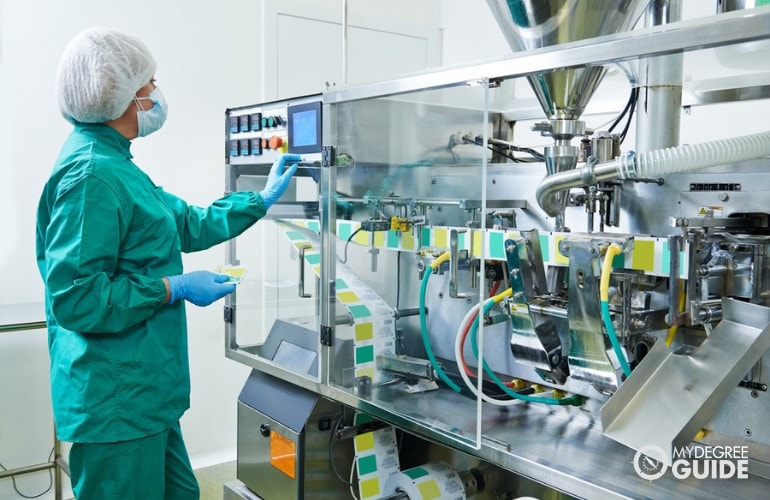
Chemistry involves the microscopic study of reactions between molecules and substances. Working in laboratories, chemists observe these reactions and figure out how to create new substances and materials.
Chemical engineering takes a multidisciplinary approach, using raw chemicals to design and manufacture products. The goal of chemical engineers is to create systems and materials that improve the health, safety and ease of everyday life, including food manufacturing, fossil fuels, pharmaceuticals, and plastics.
Chemistry majors spend most of their time in lectures and labs. Chemical engineering majors combine chemistry with engineering courses that emphasize the application of principles from chemistry, physics, and math.
What’s the Difference Between Chemical Engineering vs. Mechanical Engineering?

Chemical engineers and mechanical engineers both create new products. Traditional or online mechanical engineering degree programs focus on working with mechanical devices with moving parts. Chemical engineering degree programs focus on processing, using chemicals and other substances.
Mechanical engineers design and make machines. They may spend long hours in an office environment and then travel to a production site when machinery is installed. Chemical engineers monitor production methods to establish and maintain safety protocols. So, they spend more time in manufacturing facilities.
Editorial Listing ShortCode:
Problem solving and product creation methods of the two disciplines differ from each other. Where chemical engineers use chemical reactions to create products, mechanical engineers work with the science of motion and materials.
Is a Degree in Chemical Engineering Worth it?
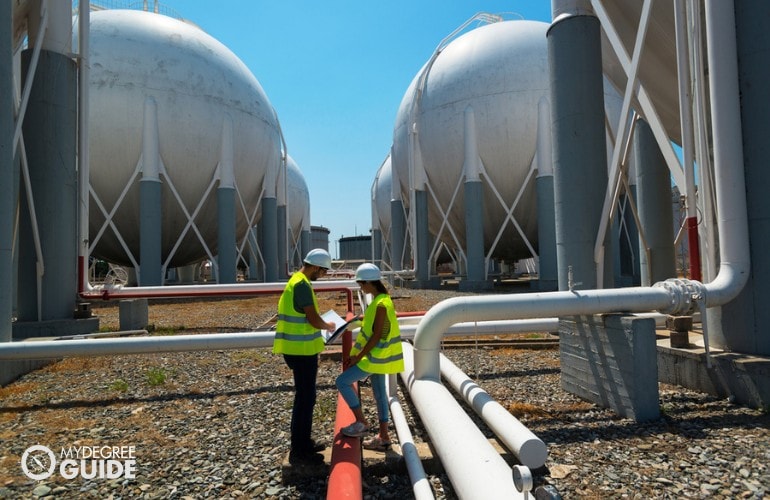
Yes, a bachelor of chemical engineering degree is worth it for many students. The Bureau of Labor Statistics is projecting 3% job growth in architecture and engineering occupations over the next 10 years. Common careers in this field include process development, environmental engineering, petrochemical engineering, research, and project management.
Chemical engineers are employed in such a wide range of industries that their job prospects are versatile. According to the Bureau of Labor Statistics, the demand for chemical engineers in the coming decade will be related to the demand for popular manufactured products.
With your degree in chemical engineering, you can work not only in offices and laboratories but also onsite in refineries and industrial plants. Chemical engineers get to work hands-on to solve problems and improve methods and materials that enhance the safety and quality of life for everyone.
Getting Your Chemical Engineering Degree Online

If you liked your high school science and math courses and excelled in them, then a bachelor’s degree in chemical engineering may be the right goal for you.
Put your critical thinking skills to work earning a degree that can open doors to high-paying jobs in high-demand industries. Although online chemical engineering courses are challenging, you can reap the benefits of starting your degree program and sticking to it.
You’ll want to do more research to find an accredited school that’s right for you. This is only the beginning of an educational journey that can benefit you throughout the rest of your life.
